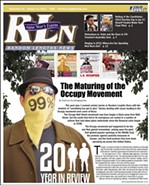Scant Coverage of Air War in Iraq Debate
Last month brought a dramatic shift in the national debate over Iraq war policies. On Capitol Hill and in major news outlets, the option of swiftly withdrawing U.S. troops -- previously treated as unthinkable by most partisan leaders and media pundits -- became part of serious mainstream media conversation. But large-scale American military involvement in Iraq is hardly on its last legs.
Media coverage has viewed the number of boots on the ground as the measure of the U.S. war effort in Iraq. Public discussion assumes that a reduction of American troop levels there will mean a drop in the Pentagon’s participation in the carnage. But it ain’t necessarily so.
In fact, beneath the surface of mass-media discourse, there are strong indications that the U.S. military command will intensify its bombardment of Iraq while reducing the quantity of American troops in that country before the U.S. congressional elections next fall. With the White House clearly eager to show progress with U.S. disengagement from Iraq, we should expect enormous media spin to accompany any pullout of troops in 2006.
One of the few American journalists to foreshadow an escalation of the U.S. air war is Seymour Hersh, who wrote in the Dec. 5 issue of The New Yorker that “the American air war inside Iraq today is perhaps the most significant -- and underreported -- aspect of the fight against the insurgency.” The magnitude of U.S. bombing is something of a mystery in American media. “The military authorities in Baghdad and Washington do not provide the press with a daily accounting of missions that Air Force, Navy, and Marine units fly or of the tonnage they drop, as was routinely done during the Vietnam War.”
Surely the media spinners in the White House are aware that the air war in Iraq has been flying largely beneath the U.S. media’s radar. “In recent months, the tempo of American bombing seems to have increased,” Hersh reports. “Most of the targets appear to be in the hostile, predominantly Sunni provinces that surround Baghdad and along the Syrian border. As yet, neither Congress nor the public has engaged in a significant discussion or debate about the air war.”
That kind of inattention augurs well for a scenario of withdrawing sizeable numbers of U.S. troops while stepping up the air war. Hersh, who has good sources within the Pentagon, suggests that’s in the offing: “A key element of the drawdown plans, not mentioned in the president’s public statements, is that the departing American troops will be replaced by American airpower. Quick, deadly strikes by U.S. warplanes are seen as a way to improve dramatically the combat capability of even the weakest Iraqi combat units.”
The U.S. news media haven’t yet confronted a possibility that is both counterintuitive and probable: The U.S. military could end up killing more Iraqi people when there are fewer Americans in Iraq. “Lowering the number of U.S. troops in conjunction with a more violent air war and creation of an Iraqi client military, as some are suggesting, will likely increase the number of Iraqis killed,” says Joseph Gerson of the American Friends Service Committee. “This would in effect be ‘changing the color of the corpses’ in order to make the continuing war more palatable to the U.S. public.”
There is a strong precedent for such a politically driven strategy. Midway through 1969, President Richard Nixon announced the start of a “Vietnamization” policy that cut the number of U.S. troops in Vietnam by nearly half a million over a three-year period. But during that time, the tonnage rate of U.S. bombs dropped on Vietnam actually increased.
A similar sequence of events is likely to get underway next year, before the November elections determine which party will control the House and Senate until early 2009. Caught between the desire to prevent a military defeat in Iraq and the need to shore up Republican prospects at home in the face of an unpopular war, President Bush is very likely to escalate the U.S. air war in Iraq while reducing U.S. troop levels there. If so, he has good reason to hope that the American news media will downplay the human consequences for Iraqi people.
Norman Solomon is the author of the recent book “War Made Easy: How Presidents and Pundits Keep Spinning Us to Death.”





